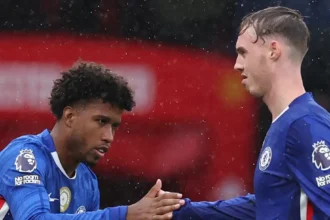After yet another humiliating defeat, this time to League Two’s Grimsby Town in the Carabao Cup, Manchester United boss Ruben Amorim is sounding less like a man determined to lead a revival and more like one quietly edging toward the exit. Despite being just 300 days into the job, Amorim’s recent comments and demeanor hint at a shift in mindset—from hopeful reformer to a manager seemingly prepared to walk away.
From Bright Eyes to Burnout: Amorim’s Evolving Persona
When Ruben Amorim arrived at Old Trafford, he was full of energy, optimism, and bold ideas. In a November interview with Gary Neville, he joked about Manchester’s weather and spoke passionately about rebuilding a fallen giant. But as the losses stacked up, so did the emotional weight.
By January, his tone had already turned. After a 3-1 loss to Brighton, Amorim openly admitted: “We are the worst team maybe in the history of Manchester United.” While rare in its honesty, the statement startled fans and highlighted the psychological toll the job was taking.
Taking the Blame—Then Drawing a Line
What separated Amorim from most managers was his early willingness to shoulder blame. Where others deflect criticism toward referees or players, Amorim used “we” in every post-match explanation. Even when INEOS boss Sir Jim Ratcliffe called out the squad’s lack of quality, Amorim stood in defense of the team.
But that collective responsibility may have reached its limit. After losing the Europa League final to a dismal Tottenham side and now crashing out of the cup to Grimsby, Amorim’s tone has changed. For the first time, he aimed his frustrations squarely at the players.
“They spoke really loud today about what they want,” he said, implying a lack of commitment or belief within the squad. He didn’t defend tactics. He didn’t look to the future. He offered an apology and left the rest to interpretation.
The Grimsby Game: A Defining Low Point
United’s shootout defeat to Grimsby wasn’t just another bad result—it was an embarrassment on a historic scale. A team worth hundreds of millions fell to a club from a town with a population smaller than Old Trafford’s capacity.
The penalty shootout was torturous, ending with Bryan Mbeumo—one of United’s marquee signings—missing the final spot kick. Amorim sat motionless, head down, isolated in the dugout. His post-match interview on ITV revealed a manager emotionally drained, slumped in posture, avoiding eye contact, and most tellingly, speaking about “limits.”
“You cannot change everything in one summer,” he said. “I think this is a little bit the limit… something has to change.”
No More Promises, No More Defiance
Amorim had once declared he would leave without compensation if the board lost faith in him—a stance that would cost him nearly £12 million. After the Grimsby match, however, that statement was nowhere to be found. In its place were vague allusions to change, disappointment, and a hint that he may no longer see a future with the club.
What’s clear is that Amorim is feeling the same frustration that consumed many of his predecessors. A bloated, underperforming squad, internal disconnects, and relentless scrutiny from pundits and fans have ground him down. Unlike before, he no longer seems eager to prove he’s the right man for the job—he just looks tired of proving anything at all.
The Beginning of the End?
There’s no official indication that Amorim is set to be sacked. In fact, the board backed him in the summer with close to £300 million in transfers. But emotionally and mentally, Amorim appears to be teetering.
Managers rarely walk away—ego and compensation tend to keep them rooted—but Amorim’s recent remarks suggest he may not wait to be pushed. Grimsby may go down as more than a humiliating cup exit—it could mark the moment Amorim stopped believing this project could be saved.











